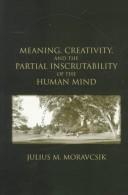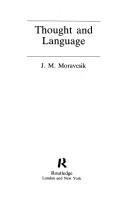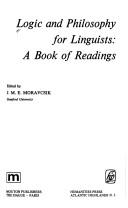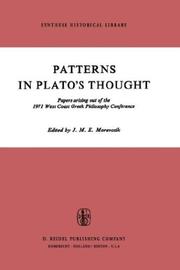| Listing 1 - 10 of 15 | << page >> |
Sort by
|

ISBN: 1575861267 1575861275 Year: 1998 Publisher: Stanford (Calif.): CSLI
Abstract | Keywords | Export | Availability | Bookmark
 Loading...
Loading...Choose an application
- Reference Manager
- EndNote
- RefWorks (Direct export to RefWorks)
Lexicology. Semantics --- Philosophy of language --- Language and languages --- Philosophy of mind. --- Semantics. --- Philosophy. --- Philosophy of mind --- Semantics --- Mind, Philosophy of --- Mind, Theory of --- Theory of mind --- Formal semantics --- Semasiology --- Semiology (Semantics) --- Philosophy --- Cognitive science --- Metaphysics --- Philosophical anthropology --- Comparative linguistics --- Information theory --- Lexicology --- Meaning (Psychology)

ISBN: 0415043220 0415071054 Year: 1990 Volume: vol *10 Publisher: London Routledge and Kegan Paul
Abstract | Keywords | Export | Availability | Bookmark
 Loading...
Loading...Choose an application
- Reference Manager
- EndNote
- RefWorks (Direct export to RefWorks)
Philosophy of language --- Theory of knowledge --- Being --- Denken --- Etre (Philosophie) --- Ontologie --- Ontology --- Pensée --- Thought and thinking --- Zijn (Filosofie) --- Zijnsleer --- Language and languages --- -Ontology --- Mind --- Thinking --- Thoughts --- Educational psychology --- Philosophy --- Psychology --- Intellect --- Logic --- Perception --- Psycholinguistics --- Self --- Metaphysics --- Necessity (Philosophy) --- Substance (Philosophy) --- Foreign languages --- Languages --- Anthropology --- Communication --- Ethnology --- Information theory --- Meaning (Psychology) --- Philology --- Linguistics --- Psycholinguistics. --- Comprehension. --- Thought and thinking. --- language. --- Språk och tanke. --- Språkfilosofi. --- Språkpsykologi. --- Philosophy.

ISBN: 9027931119 9789027931115 Year: 1977 Volume: 169 Publisher: The Hague Mouton
Abstract | Keywords | Export | Availability | Bookmark
 Loading...
Loading...Choose an application
- Reference Manager
- EndNote
- RefWorks (Direct export to RefWorks)
Philosophy of language --- Language and languages --- Semantics --- Grammar, Comparative and general --- Philosophy --- Syntax --- -Semantics --- Formal semantics --- Semasiology --- Semiology (Semantics) --- Comparative linguistics --- Information theory --- Lexicology --- Meaning (Psychology) --- Comparative grammar --- Grammar --- Grammar, Philosophical --- Grammar, Universal --- Philosophical grammar --- Linguistics --- Philology --- Grammar, Comparative --- Semantics. --- Syntax. --- Philosophy. --- -800.1 --- Foreign languages --- Languages --- 800.1 Taalfilosofie --- Taalfilosofie --- 800.1 --- Language and languages - Philosophy --- Grammar, Comparative and general - Syntax --- Grammar, Comparative and general Syntax
Book
ISBN: 1557862028 Year: 1992 Volume: vol 1 Publisher: Oxford Blackwell
Abstract | Keywords | Export | Availability | Bookmark
 Loading...
Loading...Choose an application
- Reference Manager
- EndNote
- RefWorks (Direct export to RefWorks)

ISBN: 0391003992 9780391003996 Year: 1974 Publisher: The Hague Mouton
Abstract | Keywords | Export | Availability | Bookmark
 Loading...
Loading...Choose an application
- Reference Manager
- EndNote
- RefWorks (Direct export to RefWorks)
Language and logic --- Linguistics --- Logic --- Semantics (Philosophy) --- Langage et logique --- Linguistique --- Logique --- Sémantique (Philosophie) --- Methodology --- Méthodologie --- Sémantique (Philosophie) --- Méthodologie --- Language and logic. --- -Semantics (Philosophy) --- Intension (Philosophy) --- Logical semantics --- Semantics (Logic) --- Semeiotics --- Significs --- Syntactics --- Unified science --- Linguistic science --- Science of language --- Linguistics and logic --- Logic in language --- Language and languages --- Logic, Symbolic and mathematical --- Logical positivism --- Meaning (Psychology) --- Philosophy, Modern --- Semiotics --- Signs and symbols --- Symbolism --- Analysis (Philosophy) --- Definition (Philosophy) --- Semantics --- Argumentation --- Deduction (Logic) --- Deductive logic --- Dialectic (Logic) --- Logic, Deductive --- Intellect --- Philosophy --- Psychology --- Science --- Reasoning --- Thought and thinking --- Philosophy of language --- Linguistics - Methodology

ISBN: 9027702861 9401025479 9401025452 9789027702869 Year: 1973 Publisher: Dordrecht Reidel
Abstract | Keywords | Export | Availability | Bookmark
 Loading...
Loading...Choose an application
- Reference Manager
- EndNote
- RefWorks (Direct export to RefWorks)
Plato --- Congresses --- -Aflāṭūn --- Aplaton --- Bolatu --- Platon, --- Platonas --- Platone --- Po-la-tʻu --- Pʻŭllatʻo --- Pʻŭllatʻon --- Pʻuratʻon --- Πλάτων --- אפלטון --- פלאטא --- פלאטאן --- פלאטו --- أفلاطون --- 柏拉圖 --- 플라톤 --- -Congresses --- Aflāṭūn --- Congresses. --- Platon --- Platoon --- Платон --- プラトン --- Plato - Congresses

ISBN: 615505374X 1281377015 9786611377014 141757724X 9781417577248 9789639241794 9639241792 9786155053740 9781281377012 6611377018 Year: 2004 Publisher: Budapest New York
Abstract | Keywords | Export | Availability | Bookmark
 Loading...
Loading...Choose an application
- Reference Manager
- EndNote
- RefWorks (Direct export to RefWorks)
This book, like in classical times of Plato and Aristotle, treats individual and communal ethics as intertwined. At its heart lies the quartet of respect, concern for welfare of others, trust, and care as the basic communal ties. The community needs to be built on these. Acquisition and practice of other values and goods are within the frame of the four underlying "pillars." The four basic notions are attitudes and as such consist of both rational and emotional elements. Thus our ethics is neither based purely on sentiment nor purely on reason. As such they will yield us guidelines, to be filled in contextually, not rigid rule systems. Moravcsik's proposal for ethics is pluralistic but not relativistic. It does not deny some objective ground for sound communal life, but leaves many alternatives within which the four basic ties can be implemented.
Ethics. --- Deontology --- Ethics, Primitive --- Ethology --- Moral philosophy --- Morality --- Morals --- Philosophy, Moral --- Science, Moral --- Philosophy --- Values --- Ethics, Philosophy.
Book
Year: 1968 Publisher: London Macmillan
Abstract | Keywords | Export | Availability | Bookmark
 Loading...
Loading...Choose an application
- Reference Manager
- EndNote
- RefWorks (Direct export to RefWorks)
Book
Year: 1962 Publisher: Indianapolis (Ind.) Bobbs-Merrill
Abstract | Keywords | Export | Availability | Bookmark
 Loading...
Loading...Choose an application
- Reference Manager
- EndNote
- RefWorks (Direct export to RefWorks)
Book
Year: 1967 Publisher: Garden City Doubleday
Abstract | Keywords | Export | Availability | Bookmark
 Loading...
Loading...Choose an application
- Reference Manager
- EndNote
- RefWorks (Direct export to RefWorks)
| Listing 1 - 10 of 15 | << page >> |
Sort by
|

 Search
Search Feedback
Feedback About UniCat
About UniCat  Help
Help News
News